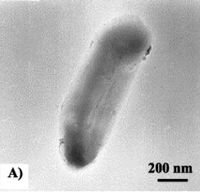User:Merrillh
Classification
Domain: Bacteria
Phylum: Proteobacteria
Class: Gamma Proteobacteria
Order: Alteromonadales
Family: Shewanellaceae
Genus: Shewanella
Species
Shewanella algae
|
NCBI: Taxonomy |
Description and Significance
Shewanella algae is a gram-negative, rod-shaped, motile bacilli with a single polar flagellum. S. algae is found in warm Marine environments throughout the world, and is isolated form seawater at with 15-20% salinity (Holt 2005).
Shewanella algae is of interest because of its potential to be a serious human pathogen. It is known to cause peritonitis and obstructive pneumonia, rupture of aortic aneurysm, ear infections (Beleneva 2009) bacteraemia, rare occurrences of skin and soft tissue infections (Myung 2009), bone and joint infections, and many others (Holt 2005).
In the past, its effects has often been attributed wrongly to Shewanella putrefaciens. There has been a rising number of disease cases attributed to S. algae in the last decade, thanks to correct classification.
Shewanella algae is associated with bacterial peritonitis. The species is also of interest because of its potential to treat radioactive waste in groundwater. It has the ability to reduce uranium and plutonium by reducing soluble forms to insoluble forms (Mulvany 2010).
Genome Structure
Describe the size and content of the genome. How many chromosomes? Circular or linear? Other interesting features? What is known about its sequence?
Cell Structure, Metabolism and Life Cycle
Interesting features of cell structure; how it gains energy; what important molecules it produces.
Ecology and Pathogenesis
Habitat; symbiosis; biogeochemical significance; contributions to environment.
If relevant, how does this organism cause disease? Human, animal, plant hosts? Virulence factors, as well as patient symptoms.
References
"[1]" Beleneva, Irina A., et al. Biochemical and pathogenic properties of the natural isolate of Shewanella algae from Peter the Great Bay, Sea of Japan. Journal of Invertebrate Pathology, 2009. Volume 102: 250-255.
"[2]" Holt, H.M., et al. Shewanella algae and Shewanella putrifaciens: clinical and microbiological characteristics. Clinical Microbioly and Infection, 2005. Volume 11: 347-352.
"[3]" Mulvany, Elisabeth, et al. Peritonitis secondary to multiple, full-thickness jejunal wall perforations in a California Sea Lion. Marine Mammal Pathology, 2010. Volume 1.
"[4]" Myung, D.S., et al. Primary Shewanella algae Bacteremia mimicking Vibrio Septicemia. Journal of Korean Medical Science, 2009. Volume 24(6): 1192-1194.
"[5]" Konishi, Y., et al. Microbial deposition of gold nanoparticles by the metal-reducing bacterium Shewanella algae. Electrochimica Acta, 2007. Volume 53(1): 186-192.
"[6]" Ogi, Takashi, et al. Recovery of indium from aqueous solutions by the Gram-negative bacterium Shewanella algae. Biochemical Engineering Journal, 2012. Volume 63: 129-133.
"[7]" Vogel, Birte F., et al. Homogeneity of Danish Environmental and Clinical Isolates of Shewanella algae. Applied Environmental Microbiology, 2000. Volume 66(1): 443-448.
Author
Page authored by Deonte Swift and Hannah Merrill, students of Prof. Jay Lennon at Michigan State University.
<-- Do not remove this line-->

